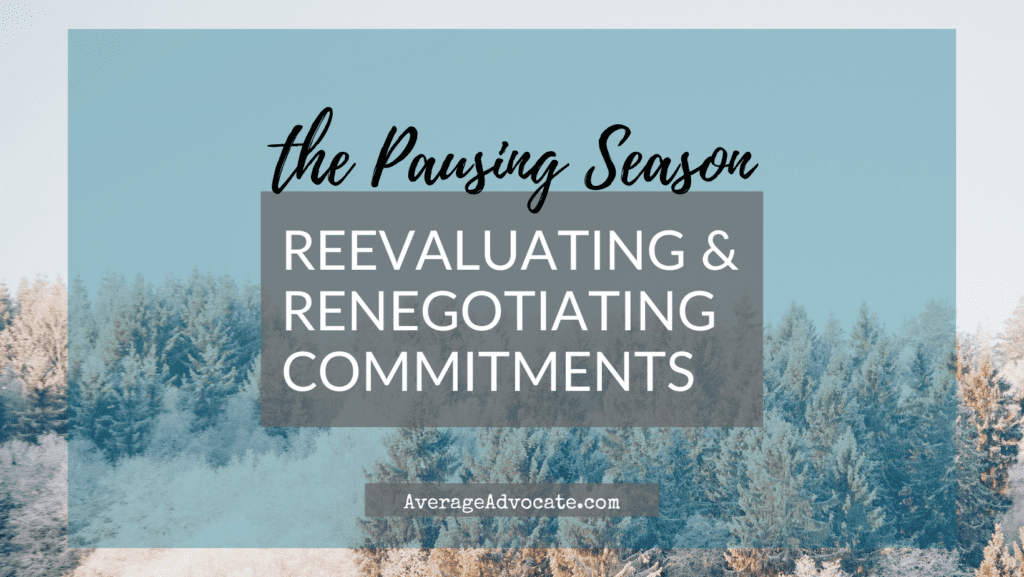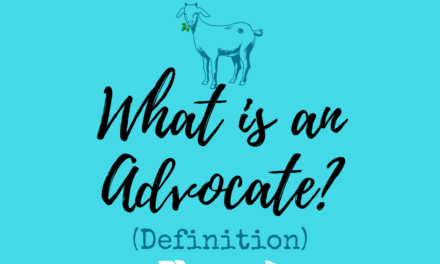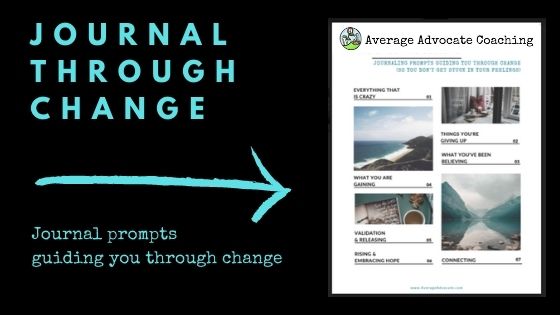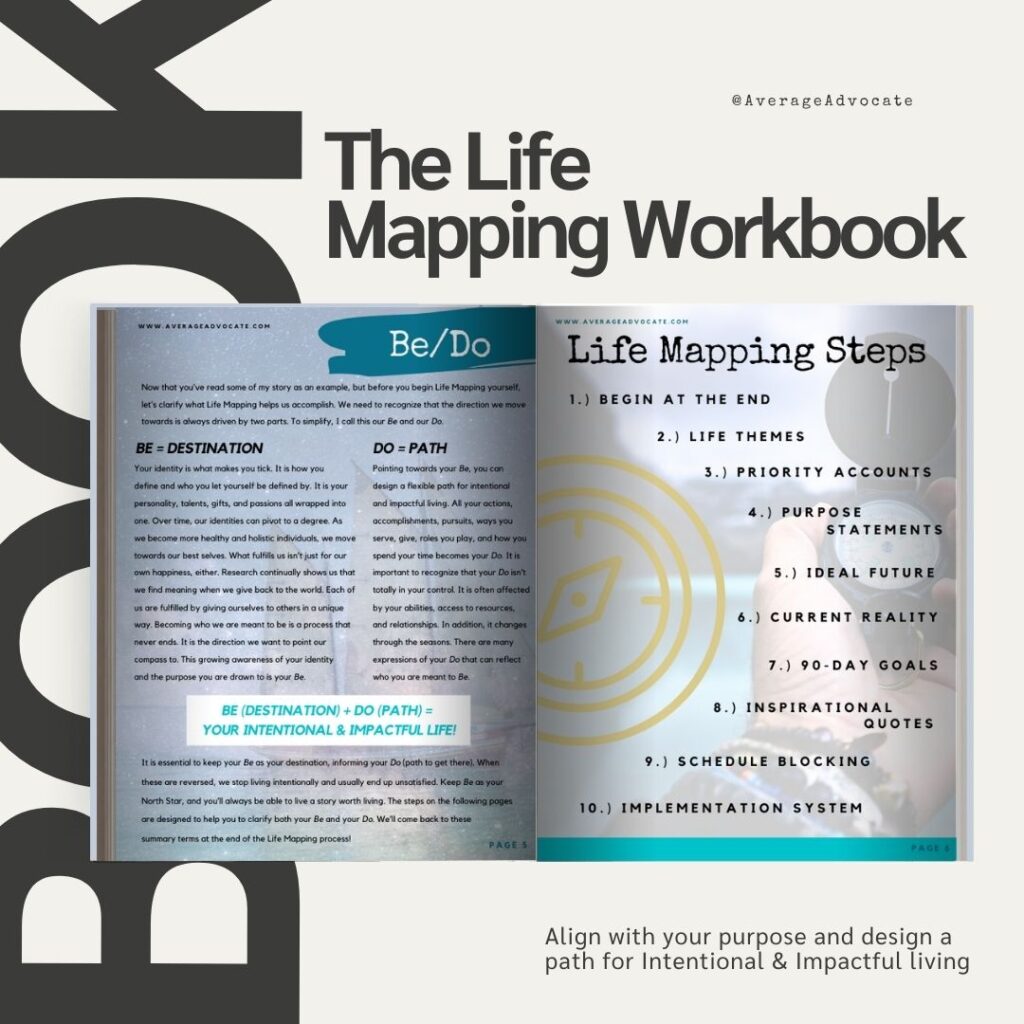I texted the carpool mom, “See you at 8:45!” She wrote me back, “7:45! 😂 Back to the grind!” I guess have to get my head back in the game! Coming off the holidays, we went on a much needed anniversary trip. But, now it is time to hit the “grind” again and begin adulting. I use the New Year as a marker. It is time to pause to reevaluate and renegotiate my commitments as a changemaker and everyday human of responsibilities.

Why Reevaluate and Renegotiate?
Reevaluation is an essential part of being a healthy changemaker and leader. I can’t tell you how many times I’ve talked with burned out volunteers who keep doing the same work that is sucking the life out of them, over and over. Or there is the spouse whose mental load is unmanageable. The couple never change the responsibilities they individually manage and don’t have a way to talk about it. Then there is the activist who is still doing the same types of awareness campaigns, not recognizing that they aren’t effective anymore and there are new ways to engage people. The examples go on.
From our personal lives to our external lives we have to say goodbye to the old and bring in the new.
Change is a challenge for a lot of people, and although I usually embrace change as a futurist, I get it. Grief and saying goodbye is hard, especially when we are loyal or have created things. Having founded multiple nonprofits/ministries, recognizing it was time for me to move on or close them down has been one of the hardest things I’ve ever done. But if I didn’t do this, then I would have never become the person I needed to be, would have never led others where they needed to go, or given then a way to rise up. Honestly, we would not be in our best fit as changemakers.
Phase Four of Rising Up
Reevaluating and renegotiating our commitments are essential parts of being the changemakers we are meant to be. In my faith, we talk about this in terms of moving into the gifts God has given us, following his leading. In coaching terms, we call this being you, finding your path, and aligning with your values. In activism/changemaking terms, this is the fourth Phase Four of Rising Up, INTENTIONAL. (Yes, please grab your free guide through these five phases if you haven’t yet!)
What do these terms this mean?
Reevaluate: My old friend Merriam Webster states that to evaluate is “to determine or fix the value of” or “to determine the significance, worth, or condition of usually by careful appraisal and study.” When we “re” evaluate, we do it again and again, as a continual practice, especially after life changes or new information. The only way we can really know if something has value or worth–especially what we do with our lives–is if we actually take the time to consider it.
Renegotiate: Most contracts have a time stamp on it. Whether it is a Household Agreement, a mortgage, or a contract for a job that has scheduled evaluations, the commitment is written out. This type of clarity is kind. However, much generosity, unpaid labor, and volunteer work doesn’t come with a contract. It is way we have to be responsible for our own negotiations of commitment and clarity. Part of the reason I burned out myself was because I didn’t know how to self-advocate to find a stopping place, change responsibilities, and switch roles. Even if your leaders in these environments don’t give you a way to renegotiate a commitment, you can ask for clarity up front. If it is too late for “up front,”X start doing it and making seasons to review. The same goes for if you are your own leader (ex. you started a nonprofit or you are a partner of equal value in a relationship).
Tools to Help You Reevaluate and Renegotiate:
Choose a Word for the Year:
This is a super common and easy way to reevaluate your last year and make an intention for a new one. I have a lot of thoughts about this. There are quite a few myths around a word for the year. Read my post to get an idea of how this works and doesn’t work:
A Good Look Reflection:
This is made for changemakers “a hopeful, grace-filled reflection on 2023 and how to set intentions for 2024” from artist and activist Danielle Coke Balfour (free downloads):
SWOT Analysis:
This is one I learned from 3DM Ministries, but it is pretty common in businesses and organizations. Recently, I used it for myself at the Ezer Collective women’s leadership conference and reminded me how cool it is to use as a personal reevaluation. Here are the notes about it I used for the Mentorship Circle.
Hello/Goodbye:
One of my favorite processing tools is the Hello/Goodbye. This is a faith-based resource, but many of the elements can be used by everyone. One of my favorite parts is making a timeline of the last year (including emotional ups and downs). There is also a family version you can use. I usually use it either throughout December or January. What is it time for you to leave behind and say goodbye too? What is it time for you to welcome and say hello to?
- Grab your copy here
- If you want to listen to how to do Hello/Goodbye, one of these episodes is for you!
- (They also have a slew of other great evaluation tools, so check these others out)
Journal Through Change
This short journal I designed and wrote originally during COVID-19 to process change, let go, and move forward. I had a grief therapist work with me to make sure it was on-point. I’ve used it multiple times in other seasons of transition, and it can be for pauses between seasons, like New Years too.
- Get it from my free resources
Life Mapping:
This workbook is all about aligning and re-prioritizing. It takes a whole system approach, starting with life direction, vision, and themes and values. Then it moves into guiding you through SMART goals and creating an ideal schedule that you revise every 90-days. I often don’t get around to revising mine that frequently, but at least two or three times a year I pull it out to make sure I am pointed the way I need to go to be the person I was designed to be. Grab your Life Mapping Workbook here.
Partner/Family Renegotiation of Responsibilities Cards:
One of the most challenging things is having a method to renegotiate relationship responsibilities, especially with your spouse or people you live with. These cards help. I’ve had someone tell me they used cards like these in the workplace, too.
- Fair Play book/cards (I haven’t read the book, but I’ve watched something by the author and love the concept)
- My friend has worksheet resources that she wrote to help with mental load and again renegotiating family responsibilities. Grab it for free here.
Roses, Thorns, Buds
In a group or as a family go around at take turn naming the last year’s roses, thorns, and buds.
- Roses = good/highs
- Thorns = hard, sad, difficulties
- Buds = what you anticipate or are looking forward to
Leadership Evaluation
I’ve used different versions of this for leaders and just everyday people of influence I was leading both in my nonprofit and in the Mentorship Circle. I’ve also used it personally.
- Average Advocate Leadership Evaluation
Good luck!
I obviously believe in living with intentionality and this season is a great time to pause and reflect on whether you are. I hope some of these resources empower you to live intentionally, reevaluate, and renegotiate commitments. Feel free to add links to your own relevant resources and ideas you use during the New Year in the comments below!











